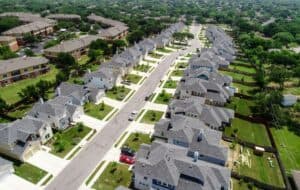When buying a property, take into consideration all the different factors including the presence of a Homeowners Association, and if there is an HOA management company involved. If this is the case, you’re more than likely going to be required to abide by strict rules and to pay the monthly HOA fees. For some, an HOA is a deal-breaker, while for others it’s a good selling point.
Read on to fully understand what living in an HOA is like, and how this type of community could affect you, and your overall quality of life.
What Is HOA?
A Homeowners Association (HOA) is an independent organization that sets and upholds various rules and regulations to ensure the maintenance and enhancement of the community. It consists mainly of single-family houses, townhouses, high rises, or condominiums.

What Is The History of HOA?
In early 1900, the traditional Homeowners Association was established in Los Angeles. Two of the first HOAs were the Arroyo Seco Improvement Association and the Los Felix Improvement Association.
These planned neighborhoods established legal precedent for zoning district set-up, especially for luxury residences. The restrictions included provisions and an upscale cost of construction which led to discrimination against the people who can purchase a property.
After many years passed, the Fair Housing Act of 1968 finally officially changed the way HOAs would be run.
Types of HOAs
Different types of properties come with different kinds of homeowners associations.
Single-Family Communities
The single homes community association hosts detached and individually owned primary residence from middle-class to more affluent families. The HOA dues cover lawn care, communal space maintenance, and snow removal.
Condominium Communities
Condominiums are situated in a building or community with multiple units. These privately owned residences pay HOA fees for maintenance and access to common areas such as the swimming pool and fitness center.
Townhouse Communities
Owners of these multi floors, attached to adjacent, individually owned units are responsible for most of the maintenance. Generally, they pay fees at a lower rate than condo residents to cover services such as trash removal and access to amenities.
What Does the HOA Do?
The HOA management or HOA boards are composed of elected residents who take charge of various functions in the community associations. These may vary a little differently, but the number of things they do affect the neighborhood.
- Manage the common areas and community properties such as swimming pools, fitness rooms, and tennis courts
- Create and enforce rules and regulations within the HOA community
- Maintain the exterior structures from the roof, exterior painting, parking, and landscaping
- Facilitate the recycling and pest control services in the neighborhood
- Supply and pay the security officers and maintenance workers in the community
- Promote social group activities for residents in common spaces
How Does HOA Work?
The properties within the Homeowners Association have a collective set of rules and restrictions to help maintain uniformity, safety, cleanliness, and stable property values. These HOA rules must be abided by the property owners or else they will face penalties and liens.
Typically, every homeowner’s association has its governing rulebook based on the local governments. These processes, operations, and controls are included in the Declaration of Covenants, Conditions, and Restrictions (CC&R).
Also included in the HOA’s rules and regulations are the HOA fees that the homeowners must pay every month.

How Much Are HOA Fees?
Homeowners pay applicable fees in exchange for joining the community. The association fees usually vary for different organizations. They are determined by the HOA board members who prepare the annual budget.
Depending on the amenities and the property value, the homeowners should expect an annual HOA fee of around $200 to $2500 or even more. Portions of the monthly fees of the property owner will fund the cost to operate the following:
- Landscaping and pest control
- Garbage removal and pickup
- Shared utilities
- Parking maintenance
- Safety and security
When there are insufficient reserve funds, the HOA board may require the members to pay for a special assessment. This occurs when natural disasters, unanticipated problems, or unexpected expenses are needed.
Pros and Cons of A Homeowner Association
Some homeowners choose to live in HOA communities, while others find the rules too restrictive. Let’s take a look at the advantages and disadvantages of living in an HOA.
Pros
- Increase property values due to the HOA maintenance rules.
- Encourage pleasant living conditions and a well-maintained neighborhood, even with shared living spaces
- Give exclusive access to community amenities like clubhouse, playground, or gym
- Allow proper hearing and mediation of property-related issues and disputes between neighbors
- Offer the opportunity to mingle with your neighborhood during HOA social events
Cons
- Limit your power on how to maintain the design, colors, and other schemes of the home
- Stretch your monthly budget, especially if there are high HOA fees and special assessments
- Cause penalty or lien to your property due to lack of compliance with the HOA rules
- Require you to pay extra HOA fees cover for the insufficient reserve fund
The Bottomline of An HOA Community
Oftentimes, HOAs are valuable to the homeowners in the community. But their control can also be stifling to homeowners who want more freedom and privacy. Thus, every potential homeowner must do their research on the real estate developer they are interested in.
To help you find the best property, get help from a real estate agent or a mortgage broker. They’re likely to be familiar with the best property owners association for you. You can even seek out local HOA board members for your specific questions, as they are more knowledgeable about where to invest and what to avoid.


